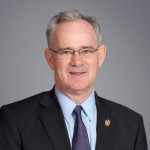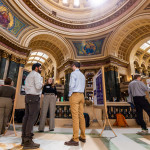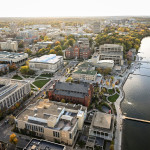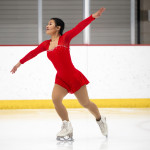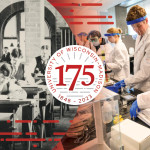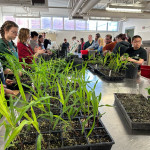Campus news Latest News
Meet the 2024 Academic Staff Excellence Award winners
Each year, the University of Wisconsin–Madison recognizes outstanding academic staff members who have excelled in leadership, public service, research and teaching. These exceptional individuals bring… Read More
Earth Fest Kickoff: Celebrating sustainability progress
Participants in UW–Madison’s first-ever Earth Fest Kickoff Celebration on Friday, April 19, praised the momentum boost for the institution’s sustainability and environmental efforts. Read More
UW–Madison and Sandia National Laboratories expand strategic partnership
UW–Madison’s science and engineering capabilities and history of partnerships make it a principal research center for topics of national security importance, such as quantum science and climate change. Read More
Earth Day experts available from UW–Madison
The 54th Earth Day will be observed on Monday, April 22. Experts from UW–Madison are available on various aspects about the day of observance, including its theme “Planet vs. Plastic,” climate change, human rights, and more. Read More
New pier planned ahead of outdoor swimming season
Ahead of the upcoming outdoor swimming season, the University of Wisconsin–Madison will install a new swimming pier on Lake Mendota near Memorial Union to replace the structure that collapsed last fall. The new $160,000 pier is anticipated to be installed in early June. Read More
Three honored for innovation, entrepreneurial excellence
Mark Bakken, James Dahlberg, and Dorri McWhorter received the 2024 Chancellor’s Entrepreneurial Achievement Awards. These entrepreneurs exemplify the Wisconsin Idea — UW–Madison’s longstanding commitment to benefiting the world beyond the boundaries of campus. Read More
From soil to sky, Day at the Capitol highlights span of UW–Madison’s impact
The day highlighted UW–Madison’s ongoing pursuit of innovation for the public good, driven by the Wisconsin Idea. Read More
Enter your amazing science visuals in the 2024 Cool Science Image Contest
Members of the UW–Madison community may enter up to three images by the June 15 deadline. Read More
AAAS members make eight UW researchers new fellows
The honor, presented annually since 1874, recognizes efforts to advance science and society, with the fellows expected to maintain the highest standards of scientific integrity and professional ethics. Read More
Robbed by COVID-19, UW seniors finally get the prom they missed in high school
"This prom was more significant than any high school prom could have been for us; it felt like a true celebration of class togetherness and putting the negative effects of the pandemic behind us." Read More
UW–Madison biochemist wins prestigious forestry prize for discoveries that support sustainable energy and product innovations
UW–Madison biochemistry professor John Ralph has been awarded the forestry industry's top prize, alongside collaborator Wout Boerjan, a professor at Ghent University in Belgium, for their groundbreaking research on the molecular structure of lignin, one of the main components of plant cell walls. Read More
Wisconsin Idea Database reveals UW–Madison’s positive impact across all 72 counties
Latest data show how UW provides educational opportunities, builds the workforce and economy in every county in the state Read More
Spins + jumps + ice = lots of fun
Students with edgy skills took to the ice with flair at the Spring 2024 Figure Skating Exhibition at the Sub Zero Ice Center at the Bakke Recreation and Wellbeing Center at UW–Madison on April 7. Read More
Student to student: Out-of-classroom experiences create ‘connectivity’
The extra benefit of out-of-classroom experiences shines through in the students’ work thereafter, as instructors notice an increased understanding of topics that students explored out in the real world. Read More
UW student with foreign policy ambitions receives esteemed Truman Scholarship
In addition to funding for graduate studies, Truman Scholars receive leadership training, career counseling, and special internship and fellowship opportunities within the federal government. Read More






